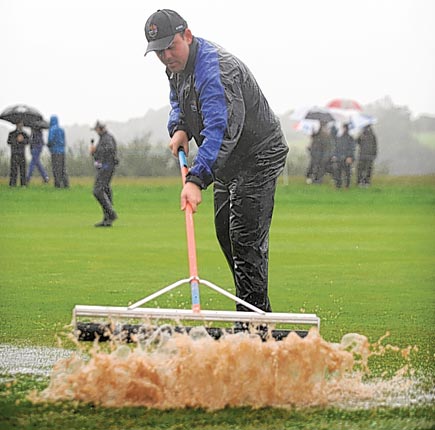James Lawton: Blaming the weather is an easy way out. Greed is the real cause of this mayhem

If golf has any interest in preserving the Ryder Cup as one of the world's great sports events it should never forget 1 October 2010.
The date, unlike so many others in the history of the event that has been so enhanced by great men like Jack Nicklaus and Seve Ballesteros, has to be logged with shame. The day has to be remembered not for the sound of torrential rain but the aroma of greed.
Forty-five thousand golf lovers were trapped with nothing to see for more than seven hours in this Welsh valley which had come to resemble a stretch of flood plain when the action was suspended. The first fourball match pitting Europe's Lee Westwood and Martin Kaymer against Americans Phil Mickelson and Dustin Johnson had sloshed its way only as far as the sixth hole – in two hours.
Rain happens, of course, but the responsibility of the organisers of the 38th Ryder Cup was always to set acceptable levels of risk and by pitching the event so late in the year, on a course where millions spent on drainage could never match the natural facility of the sandy linksland of some of Britain's best and most prestigious golf courses, that burden of care for the live spectators was disastrously neglected.
As play resumed in early evening, officials conceded that forecasts of further grim weather, particularly for tomorrow, meant there was not much hope of completing the match before Monday – and no guarantee against a farcical, arbitrary guillotining on play at a sunset timed for 6.43.
Matches in which one side had built up a formidable lead would be declared halved. It is an outrage to the dignity and the credibility of the Ryder Cup, one that could turn it into an irrelevant farce. But then no one had to look hard for an explanation.
Part of the responsibility undoubtedly belonged to the US PGA Tour, whose commissioner Tim Finchem happily posed with his compatriots on the first tee.
The US PGA required the Ryder Cup dates be pushed back in order to protect the tournament that represents their biggest motherlode of hard cash, the FedEx Cup which last week left American team member Jim Furyk $11.5m (£7.25m) richer and, before some rule changes, promised to pay Tiger Woods a pension fund of more than $100m.
Denied revenue from major tournaments – and the Ryder Cup – the American tour fiercely protects the place of the FedEx on the golf calendar. As yesterday degenerated into a marathon drinking session for many fans held captive by the bars and the food and sports good concessions, America's winning captain two years ago, Paul Azinger, pointed his finger at one basic problem.
He said, "It's a great shame. It has been dictated by the FedEx Cup date. The FedEx tournament was not invented when the Ryder Cup was awarded but its date has been pushed back and back."
The consequences, if the worst-case weather reports prove anywhere near accurate, will be nothing less than farcical. If matches have to be cut off on Monday, which is far from a remote possibility under these moist Welsh skies, a massive asterisk will have to be placed against the campaigns of Colin Montgomerie and his American counterpart Corey Pavin.
There will also be fresh doubts against the priorities of the European PGA and Ryder Cup committee. Before the undistinguished Belfry was awarded a string of four Ryder Cups between 1985 and 2002, there was a stringent tradition that the great contest should be housed in appropriate premises.
It is interesting, and rather sad, to recall the venues for the four home matches before the Belfry was elevated to what we have long been told is one of the highest levels of golf competition and, with recent hype, arguably the third most important sports event after the Olympics and the World Cup. The matches were played at Royal Birkdale, Muirfield, Royal Lytham and Walton Heath. Each one of them is a storehouse of golf tradition and the first three are links courses which would have been infinitely better equipped to absorb yesterday's downpour.
But, of course, they hosted Ryder Cup action before it was regularly hired out to some resort enterprise desperate for the revenue-drumming cachet which comes with providing battlegrounds for the likes of Tiger Woods and Lee Westwood. After the Belfry's first three Ryder Cups came the rush for such a place in the resort market: Valderamma (1997), the K Club in Kildare (2006) and now the custom-built Celtic Manor.
Profits may have been secured but as yesterday's inclusive action came to a close there was another reason to believe that financial opportunity had come at too high a price. The match might just be settled by tomorrow night – but only after a change of format which takes away much of the challenges facing the rival captains.
Montgomerie and Pavin are no longer required to leave out players on the way to the singles showdown with the introduction of a final team session of two foursomes and four fourballs. This rips away the character of this Ryder Cup. It is, more than anything, another bogey for greed.
Subscribe to Independent Premium to bookmark this article
Want to bookmark your favourite articles and stories to read or reference later? Start your Independent Premium subscription today.

Join our commenting forum
Join thought-provoking conversations, follow other Independent readers and see their replies